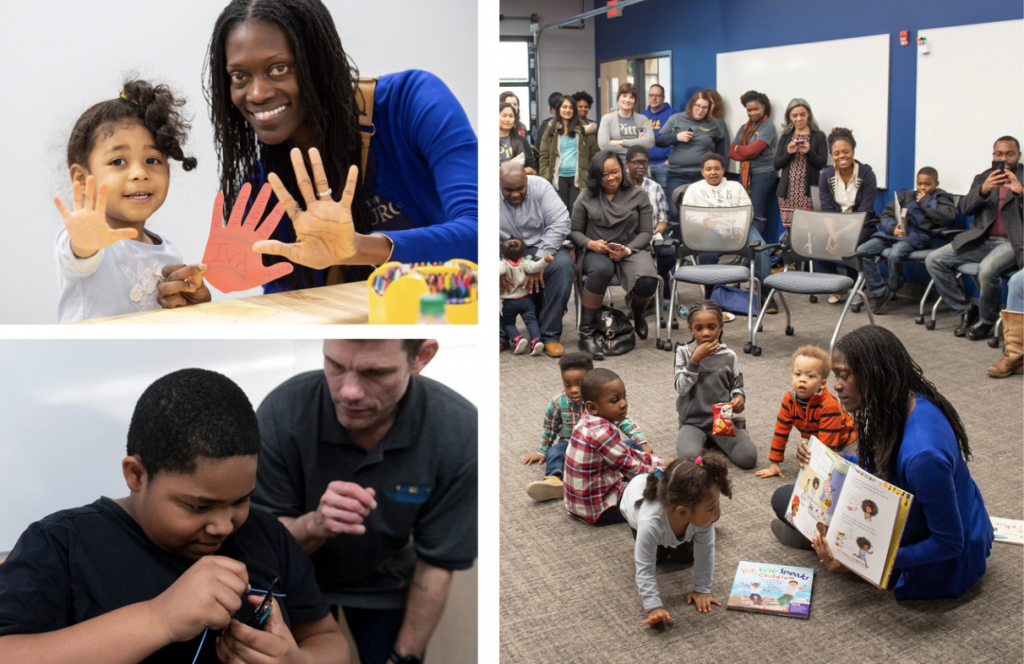Partnerships Progress, 2018-22

We will support sustainability through a robust capacity to partner.
2018 Goals & Aspirations
- LOCAL: Establish local and regional partnerships to accelerate the transfer of sustainability ideas from Pitt classrooms and laboratories through implementation.
- COLLABORATE: Connect with industry and community collaborators to support applied sustainability research and education.
- COMMUNITY: Link sustainability and Community Engagement Centers more explicitly.
- K-12 SCHOOLS: Invigorate our existing programs to increase the impact of sustainability education in the K-12 curriculum.
Where We Are: Organizational Partnerships
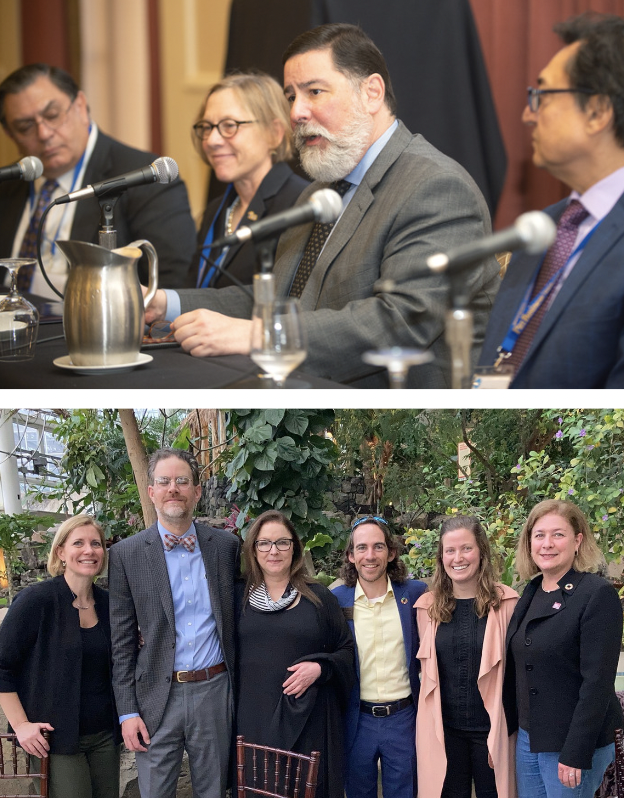
Center for Sustainable Business: Founded in 2019, the University of Pittsburgh’s Center for Sustainable Business (CSB) helps companies and students learn how to leverage investments in sustainability. With 12 member companies spanning a wide range of industries, the CSB established its Sustainable Business Forum in 2020 as a corporate peer-to-peer learning network that combines cutting-edge academic insight with open discussion to help companies learn to leverage their investment in sustainability to create more business and social value.
The CSB also connects students interested in driving research and relationship collaboration between major companies. In 2022, fellows were focused on benchmarking, clean energy, climate action, equity, ESG, and supply chain projects.
Sustainability Capstone Project Partnerships: Every semester, undergraduate students in the Sustainability Capstone course undertake semester-long projects focused on sustainability with a broad range of partners ranging from small nonprofit organizations, government agencies, to Fortune 100 and multi-national corporations. In the past several years, projects have included Avient Corporation, City of Pittsburgh, Corning, The Mosaic Company, Carnegie Museum of Art, McCandless Township, and many more.
Circular Economy Program: In Fall 2022, the University of Pittsburgh welcomed its first cohort of students into the Covestro Circular Economy Program. The first academic offering of its kind in the U.S., the program combines a circular design curriculum with an innovative training partnership with Covestro and other organizations focused on creating circular, sustainable product and service solutions.
Industry Partnerships: Pitt has partnerships across various industries on a diversity of projects; some newer collaborations announced since 2017 include:
- Alstom – Global mobile transportation leader is partnering with Engineering to make transportation smarter, more sustainable, and energy efficient through mentorship, research, and career pathways.
- Advanced Magnetics for Power & Energy Development (AMPED) Consortium – Created in 2020, the AMPED industry consortium is focused on applying advanced materials to the electric power industry to make industrial components more efficient and long-lasting. AMPED includes 20 industry members and 8 government agencies.
- Duquesne Light – The energy provider is partnering with Pitt’s Energy GRID Institute to create a collaborative platform that will advance and implement innovative solutions in support of a more secure, resilient, and clean energy grid.
- Eaton – The intelligent power management company has increased research collaborations on electric vehicle infrastructure.
- Energy Innovation Center – Pitt laboratories and incubator space at Pittsburgh’s Energy Innovation Center (EIC) in the Lower Hill District helps facilitate large-scale research and promote industry partnerships. Pitt Labs currently at the EIC include the Electric Power Technologies Laboratory, High-Temperature Corrosion Testing Laboratory, and the Next Generation Energy Conversion and Storage Technologies Laboratory.
- Leidos/Energy – National Energy Technology Lab (NETL) – Pitt’s partnership with Leidos/Energy (principal contractor to NETL) has generated more than $1.75 million in annual research by Pitt faculty dedicated to alternative energy, reducing fossil fuel dependency, grid efficiency and resilience, and related areas.
- Malvern Panalytical – The laboratory instruments manufacturer is partnering with Pitt Next-Generation Energy Conversion and Storage Technologies Lab on interior battery chemistry to enhance efficiency of energy conversion and storage.
- Peoples Gas/Essential Utilities– The natural gas provider is partnering with Pitt Engineering to identify, test, and apply novel materials to natural gas infrastructure to enable delivery of clean hydrogen safely and efficiently.
- Power Purchase Agreements –Beyond making Pitt’s energy sourcing more sustainable, Pitt’s solar and hydro power purchase agreements open the door for those facilities to be activated by faculty and students as a living laboratories for student learning and research.
- Westinghouse – The nuclear power company instituted a new five-year master research agreement to facilitate Pitt researchers’ direct collaborations on advanced clean energy nuclear research.

Sustaining Sustainability Podcast: Hosted by the Center for Sustainable Business, Sustaining Sustainability is a podcast series that started in 2021 to explore sustainability lessons and challenges magnified by the COVID-19 pandemic. Over 50 episodes have aired featuring interviews with industry managers, academic experts, government officials, and civil society leaders on sustainability topics in their fields.
Where We Are: Higher Education Partnerships
United Nations Sustainable Solutions Network: In February 2019, the University of Pittsburgh became a founding member of the U.S. Chapter of the United Nations Sustainable Solutions Network, which connects Pitt and other universities around collaborative sustainability efforts.
Additional Pitt partnerships on the local, national and global levels are detailed in the “Engagement & Awareness” and “City & Regional Connections” sections.
Where We Are: Community Partnerships
Community: The University of Pittsburgh has an extensive variety of community engagement and outreach activities. Pitt faculty, staff, and students work shoulder-to-shoulder with community leaders every day to support our various communities.
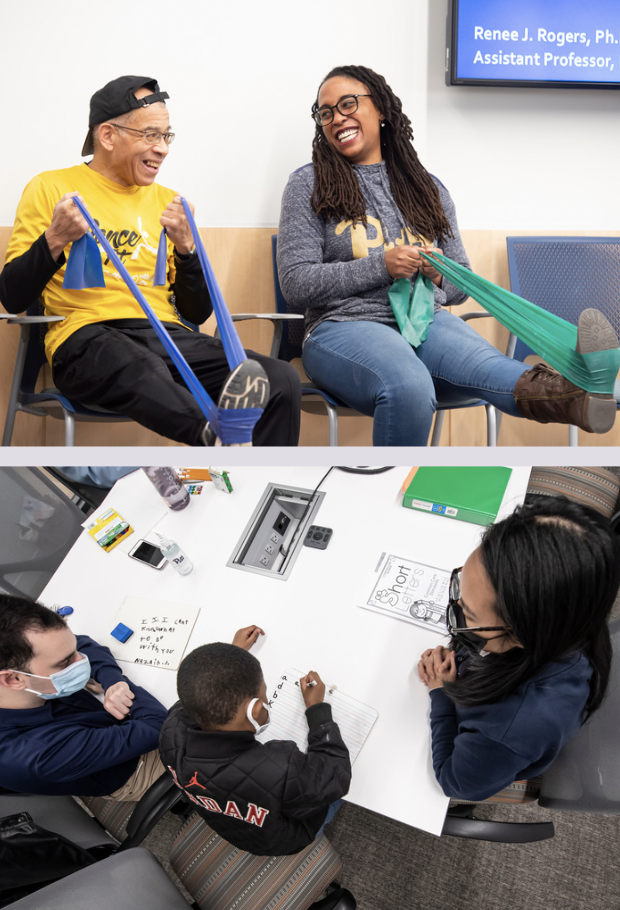
Community Engagement Centers: The University of Pittsburgh has two Community Engagement Centers (CECs) located in Pittsburgh’s Homewood and Hill District neighborhoods, with a third in planning in Hazelwood. Each CEC represents the University’s 15-year commitment to the neighborhoods by offering diverse programming, providing dedicated staff, helping build organizational capacity, and strengthening partnerships between Pitt’s educational and research capabilities with community leaders who are working to help their neighborhoods to thrive.
Since 2018, over 11,000 Pittsburgh residents have utilized Pitt’s CECs’ high quality educational, health and wellness, and economic opportunity programming. The Homewood CEC has hosted an average of 30 programs for community members annually. In 2022, the Homewood CEC operated an in-school and Saturday tutoring program for 75 students in first through fifth grades to combat learning loss during the remote schooling year; students experienced positive academic achievement outcomes in oral reading fluency, spelling, and math.
The Hill District CEC works to support underrepresented community members through programming that builds capacity, improves quality of life, advances beneficial research, and enhances education through STEM opportunities. Offering 9 programs for residents of all ages to learn about digital careers and technology. These efforts reached 229 community members via K-12 STEAM initiatives, IT workforce development, and enriched digital learning opportunities including how to use computers and gain internet connectivity).
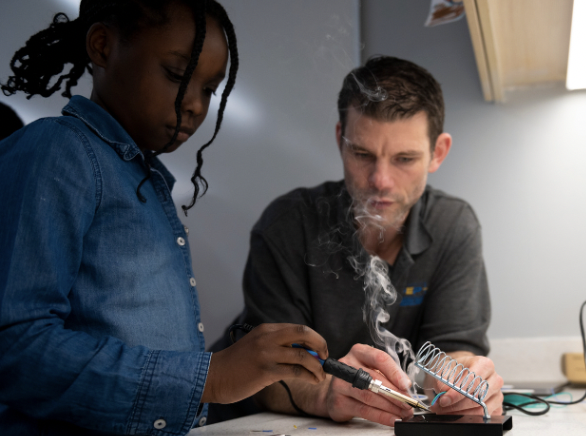
The Hazelwood CEC, Pitt’s third CEC is taking shape in Pittsburgh’s Hazelwood neighborhood and will bridge Pitt’s life sciences expertise with preK-12 education and workforce development. The Hazelwood CEC will help accelerate the University’s commitment to contributing to expanded community-guided preK-12 educational opportunities, community development, and building a more inclusive workforce.

Community Engaged Research: Since 2020, the Mascaro Center for Sustainable Innovation (MCSI) has served on the Planning Committee for Pitt’s annual “Community Engaged Scholarship Forum,” helping bring environmental justice and sustainability-related topics to the conference program and attendees.
Business Support: The University of Pittsburgh’s Institute for Entrepreneurial Excellence (IEE) provides business support for entrepreneurs and small, family-owned, and closely held businesses. In 2019 and 2020, the IEE supported 1,300 businesses – and has a variety of programs to help develop and grow minority entrepreneurs in disadvantaged communities
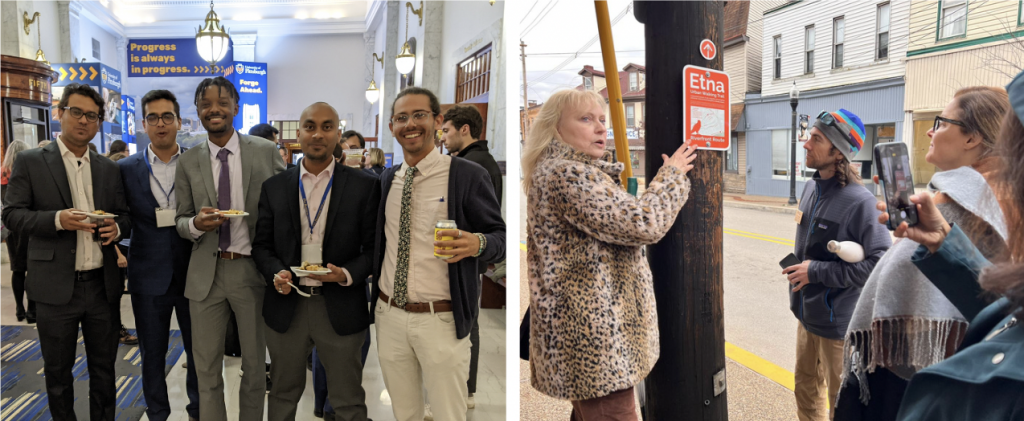
Environmental Management Assistance: Since 2015, IEE has provided free and confidential environmental assistance to small businesses through the Environmental Management Assistance Program (EMAP), which has been operating out of small business development centers (SBDC) across Pennsylvania since 1997. Through EMAP, IEE has helped educate and assist hundreds of small businesses comply with environmental regulations, embrace sustainability, pursue green business and product designations and certifications, and reduce energy consumption and greenhouse gas emissions.
- From 2018 through 2022, IEE’s EMAP provided in-depth environmental consulting assistance to 96 small businesses in Pennsylvania, including 64 new clients and 40 on-site assessments of small business facilities. IEE also helped clients submit 32 state and local environmental permits, of which 23 were approved.
- In 2022, the statewide EMAP program (including delivery via IEE) was recognized with the 2022 Small Business Environmental Assistance Program Excellence Award from the National Steering Committee of Small Business Environmental Assistance Programs & Small Business Ombudsmen.
Training: In 2020, Pitt’s Manufacturing Assistance Center (MAC) trained ~70 individuals for careers in manufacturing, which is an important part of the region’s just energy transition; at that time, 40% of MAC trainees lived in under resourced Pittsburgh neighborhoods, 31% had been previously incarcerated, and 95% of graduates were placed in living wage jobs. In 2021, the MAC relocated to Pitt’s Titusville hub, helping expand its impact across the region.
Where We Are: K-12 Education Partnerships
Allegheny Traditional Academy Energy Education: In 2021 and 2022, MCSI partnered with The Efficiency Network Inc. (TEN) to support Pittsburgh Public Schools’ plans to improve the educational experience for students and improve the teaching environment for faculty district-wide by improving Allegheny Traditional Academy’s (ATA) energy use, operational costs, and building infrastructure. Through 2022, MCSI hosted 4 educational sessions for students, which are continuing in 2023. TEN completed ATA’s energy conservation project in 2022, including lighting upgrades, a deep HVAC system retrofit, and steam-hot water conversation.
Teach the Teacher: Between 2014 and 2020, MCSI offered a 2-day Teach-the-Teacher professional development program through which middle school science teachers from across Western Pennsylvania learned how to enhance their curricula by integrating engineering and sustainability modules. Delivered in collaboration with UCLA’s Center X for Teachers, the program indirectly engaged ~2,000 students across the Pittsburgh region, over half from underserved schools. Post-workshop surveys indicated that 93% of teachers would be incorporating the sustainability modules into their classrooms and 100% recommended this series to their peers and colleagues.
